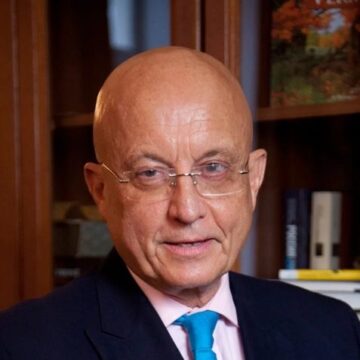I was very pleased and a little upset to read Alexei Arbatov’s comment on my article. I agree with some of his arguments but, alas, I cannot accept it for the most part.
First of all, I was pleased with this response for purely personal reasons. Alexei is a most authoritative Russian expert in nuclear disarmament, and many of us, including me, grew with his books and articles, starting with the 1970s. So his attention to my views cannot but flatter me. However, later I myself spent much time studying nuclear strategy and, as it is easy to see, I came to conclusions directly opposite to the views Arbatov adheres to.
Second, Arbatov’s article substantially highlights the arguments set out in my article and makes them more conspicuous.
And third, our controversy may encourage the Russian expert and political communities at large to launch a major discussion of the role of nuclear weapons. There is no discourse of this kind in Russia now, while the discussions that do exist are of a much lower level than even those held in Soviet times.
Arbatov’s article has not convinced me because it follows the logic of the 1960s-1980s, which I view as outdated. I myself spoke about the danger of nuclear weapons and “thousands of Hiroshimas” in those years, trying to make my own humble contribution to the efforts to stop the nuclear arms race – especially as the thoughtless Soviet policy of infinitely building up nuclear and conventional potentials was quite dismal. In the absence of serious discussions now, we can repeat some of those mistakes.
But I also know that no real nuclear threats emerged after the Cuban Missile Crisis. For example, in 1973, Washington notified the Soviet leadership that its decision to raise the alert level of the U.S. Armed Forces was not directed against the Soviet Union.
Since the end of the 1970s, I have been anxiously watching the arms control process becoming an instrument for maintaining and even whipping up the arms race. The reduction of conventional armed forces and armaments in Europe is a particularly detrimental process. Also – and Arbatov understood this perfectly well – my soul rises against the logic of traditional arms limitations and champions of these limitations, who want to drag mankind into the old game played by the rules and myths invented in a different era for different purposes.
The movement towards “nuclear zero” and the mythical “level of minimum deterrence” is in the same logic. Of course, the deterrence problem exists. But to deter the U.S. from attacking Russia, the latter may need just a few warheads which could be delivered to U.S. territory in a retaliatory strike; that is, Russia needs a potential several times smaller than it has now. Preventing an arms race in precision-guided strategic conventional weapons or missile defense systems and deterring other threats will apparently require an arsenal only slightly smaller than the present one but a modernized one. In any case, this is a matter for estimates and decisions by each party, based on common sense and realistic capabilities, but not necessarily a matter for long and difficult negotiations that evoke all possible phobias and stereotypes of the Cold War years.
Now a few words about non-proliferation. I do not think Arbatov was correct in accusing me of making an inaccurate statement that proliferation coincided in time with the period of intensive reductions of nuclear arsenals. Proliferation began not with the five members of the Nuclear Club but with the six (Israel), seven, eight and nine members, and it did take place in the period starting in the mid-1970s – the time when limitations of strategic nuclear weapons reached their peak.
I could continue arguing with my opponent over details, but not in this article. I hope Alexei Arbatov and I will provoke a discussion and break the dangerous Russian silence over the nuclear arms issue. And then we will continue our debate.
Yet, I would like to touch on two alarming arguments of my dear opponent.
I am not happy at all about Iran approaching the point of going nuclear; especially as Tehran successfully used senseless and endless negotiations according to the old logic. It played a different game and has probably won. Yet Israel should not be encouraged to deliver a preemptive strike, which would undermine the already sagging international support for this country and would only foster an arms race and a wave of instability. It would be much better to stop hiding one’s head in the sand and offer, for example, U.S.-Russian security guarantees for all countries in the region. Such guarantees could prevent a chain reaction of proliferation and raise the cost of acquisition of a nuclear capability by Iran. It would perhaps make sense to discuss guarantees for Iran as well. After all, its fears for its own security are also well-founded.
And one more, final point. Unfortunately, Russia has entered a new round of degradation, and it is unclear when it will overcome it. I hope that the homeland of Alexander Pushkin, Nikolai Gogol, Leo Tolstoy, Georgy Zhukov, Sergei Korolev and Pyotr Stolypin will find strength for its rebirth. But whatever happens, responsible citizens must ensure that the country continue existing in any era and even in a world where things do not go better. Sad as it may seem, today nuclear weapons are the only possible and attainable attribute of the status of a great world power for Russia – even if one would like very much to believe that it is not so.
Before writing this response to Arbatov’s article, I reread my own article on and saw once again that my arguments were right. It may happen, though, that neither I nor Alexei Arbatov is right, and the truth lies elsewhere. Yet we must look for it – without clinging to arguments and myths of the past century, as we can possibly manage.










